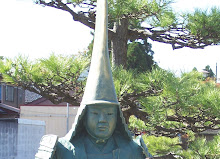Japanese aggression in WWII brought destruction and American occupation to Japan by 1945, and a feeling among the Japanese that to be defeated and humiliated in such a complete way indicated some fatal "flaw" in the culture.
While the 1950s were a time of optimism, prosperity and burgeoning international power in America - that same decade was a time of food shortages, humiliation, confusion and mourning in Japan.
Over the last 60 years the Japanese have opted for a break with their past, instead of the painful and difficult task of sorting out what is great and honorable in Japanese traditional culture, and what had to be left behind.
It's been said that Patriotism is "love they neighbor" on a large-scale. It's right that we feel proud of our country, traditions and the flag. Intelligent people understand how this differs from nationalism, which seeks to dominate other nations. Yet, despite this distinction, expression of patriotism in Japan is often stifled and labeled as militaristic or dangerous.
Japanese actress Youki Kudoh wrote a great article several years ago for Time.com entitled "Who Killed Our Culture? We Did," which tries to reawaken a sense of pride in Japanese young people. She notes:
"Most of today's young people grew up in the absence of some important values. They aren't positive about being Japanese, nor about their own identity. They are losing their integrity because they always pretend to be like someone else."While Ms. Kudoh is right to caution against the elevation of American culture over Japanese culture, she does stray a bit into some typical anti-Americanism at times; yet it can be forgiven because of the larger point she is making:
"We are negative about our culture: traditional things are seen as old-fashioned, and everything new is good. Social order and moral standards have disappeared. Some people are even obsessed with denying their Japaneseness."And when Ms. Kudoh urges young Japanese people to look at their history for that which is good, honorable and useful, she is far too modest in calling these things "hidden" in Japanese history. She notes:
"We need the confidence with which to see the good qualities hidden in our history and tell the world about them. We need a flexible mind with which we can learn about mistakes in our history and turn them into positive lessons."The war crimes and political oppression of the first half of the 20th century in Japan must be forever denounced, but Japanese culture is so rich in cultural treasures that one must work hard to ignore them.








1 comment:
This is an interesting post. However, I must note that, as long as we are looking at history, much of Ms. Kudoh's criticism might as well have been addressed to the youth of the Meiji era.
Post a Comment